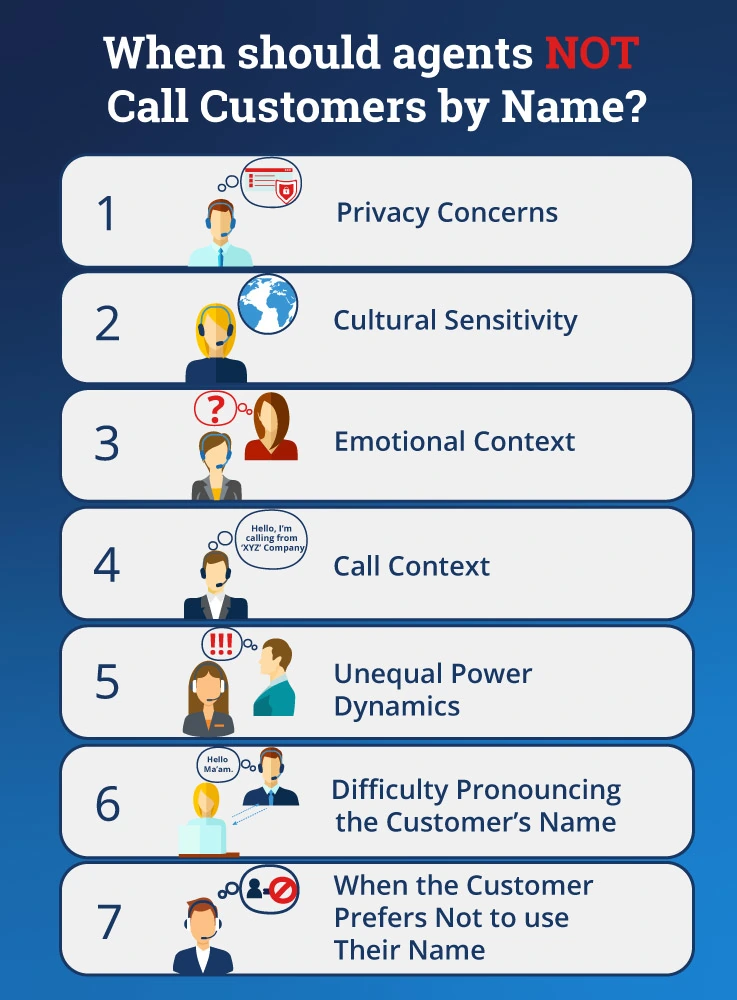As a call center agent in customer service, calling someone by their name can feel like a great way to connect. But it's important to keep in mind that there are times when using a name might not hit the mark. Knowing when to skip the name can make all the difference in a conversation, whether it's about respecting privacy or keeping things sensitive.
In this blog, we'll explore the tricky moments when call center agents should avoid using names, discuss potential missteps, and share tips on keeping things friendly without overstepping. Knowing when to use or avoid using names requires tact and awareness, and it plays a significant role in customer satisfaction.
Before we delve into the scenarios where an agent should NOT use a customer's name during a call, let's explore some reasons why using customer names is a great tool for personalization.
Why SHOULD Agents Call Customers by Name?
Addressing customers by name is more than just a nice touch; it's a powerful tool for building rapport and creating a positive customer experience. When call center agents use a customer's name, it instantly adds a personal touch to the conversation.
The simple act of using a customer's name helps to break down barriers, making the interaction feel more like a conversation between friends rather than a scripted exchange. When customers hear their name, they're more likely to feel acknowledged and valued, significantly enhancing their overall experience.

Personalization in customer service plays a critical role in fostering loyalty and satisfaction. By using a customer's name, agents can create a sense of familiarity and trust, making the customer feel important and understood.
For example, when an agent says, "Hi, Sarah, I see you've been with us for over three years—thank you for your loyalty!" it conveys appreciation and awareness of the customer's history. This level of recognition can turn a routine call into a meaningful interaction, encouraging customers to stay engaged and loyal to the brand.
Moreover, personalization can reduce frustration during calls, especially in complex or stressful situations. When customers are dealing with issues or concerns, hearing their name can provide comfort and reassurance. It reminds them that they are not just another ticket in the system; they are individuals with unique needs and preferences.
This emotional connection can help diffuse tension, making it easier for agents to address customer concerns effectively. In fact, studies have shown that customers are more likely to feel satisfied with their experience when they perceive that the agent genuinely cares about them, and using their name is a crucial part of that equation.
Additionally, using names can enhance brand perception. In an age where many interactions are automated and impersonal, a name can serve as a reminder of human connection.
Customers often prefer businesses that treat them as individuals rather than just numbers. By weaving personalization into conversations, companies can distinguish themselves in a competitive marketplace, driving customer loyalty and positive word-of-mouth.
However, keeping all this in mind, sometimes calling a customer by name can be inappropriate, disrespectful, or insensitive. We will discuss scenarios where this may be the case.
When Should Agents NOT Call Customers by Name?
While addressing customers by name can often enhance the interaction, there are certain situations where doing so can backfire or feel inappropriate. Understanding these contexts is essential for call center agents to ensure their communication remains respectful and effective.
Here are some key scenarios where using a customer's name may not be the best choice.


In an age where data privacy is a hot-button issue, customers are increasingly cautious about how their personal information is used. Using a customer's name in situations where their privacy might be at stake—such as during a call regarding sensitive information or in public forums—can be considered invasive.
For example, if customers discuss their financial details, referring to them by name can make them feel exposed or uncomfortable. In these cases, agents must prioritize the customer's sense of security over the desire for personalization.
Instead, using general terms like "customer" or "you" can help maintain a sense of professionalism while respecting the customer's privacy.

Cultural differences can also dictate how names are perceived and used in conversation. In some cultures, addressing someone by their first name too soon can be viewed as disrespectful or overly familiar, especially if the person is older or holds a higher position.
For instance, in certain Asian cultures, using titles or surnames is the norm, and switching to a first name can come off as disrespectful. Call center agents should be aware of these nuances and adjust their language accordingly. It's safer to use titles or honorifics when in doubt until the customer indicates they're comfortable with a more informal approach.

Some customer interactions involve sensitive topics that warrant a more delicate touch. If a customer calls to discuss a grievance, report a loss, or express frustration, using their name might come across as insincere or overly casual.
For example, if a customer is grieving the loss of a loved one, calling them by name while discussing funeral services or estate matters can feel jarring and impersonal. In these emotionally charged situations, agents should focus on empathetic listening and supportive language, allowing the customer to dictate the tone of the conversation.

The context of the call can also dictate whether using a name is appropriate. Using a customer's name can feel forced or even manipulative in cold calls or unsolicited marketing calls. Customers often have a heightened sense of skepticism in these situations and may feel that agents are trying too hard to create a connection.
For example, if an agent opens with, "Hi, John! I'm calling to tell you about our new service!" it may come off as disingenuous. Instead, a more neutral approach, such as "Hello, I'm calling from [Company Name]" can help establish professionalism without overstepping boundaries.
Similarly, automated systems often use names in their scripts, which can feel robotic rather than personal. When customers interact with automated systems, a lack of human touch can make name usage feel more like a gimmick than a genuine attempt at personalization. In such cases, it may be better to forgo using names altogether and stick to a more neutral tone.

In situations with a significant power imbalance—such as when the customer is in a vulnerable position or when dealing with authority figures—using a first name can feel inappropriate.
For instance, if a customer is speaking to a representative about a legal issue or a serious complaint, referring to them by name can unintentionally diminish the gravity of the conversation. In these cases, using titles or formal language can help reinforce a sense of respect and professionalism.

Another situation where using a customer's name might be inappropriate is when an agent struggles to pronounce it correctly. Names can come with varied cultural backgrounds and pronunciations that may not be familiar to everyone. If an agent asks for the correct pronunciation but still finds it difficult to say, continuing to use the name can lead to awkwardness or even frustration for the customer.
Mispronouncing someone's name, especially after trying to get it right, can undermine the intent of personalization. For example, if an agent has asked a customer named "Aisling" how to pronounce it and then repeatedly stumbles over it, the customer may feel like their identity is not being respected. This can shift the focus from a friendly interaction to a discomforting one, making the customer feel alienated rather than valued.
In these situations, gracefully avoiding using the name altogether is often better. Instead, agents can focus on using alternative forms of address, such as "sir," "ma'am," or even just a friendly "you." This ensures that the conversation remains respectful and personal without putting the customer in an uncomfortable position.

Finally, some customers may explicitly state that they prefer not to have their name used during the conversation. This could be due to personal preference or cultural reasons, and agents must respect these wishes.
If a customer indicates they prefer to be addressed differently—such as by their last name, a title, or even anonymously—agents should honor that request without hesitation. Ignoring a customer's preference can create discomfort and lead to a negative experience.
What are Alternatives to Using a Customer's Name?
When the situation calls for a more neutral approach, several effective alternatives to using a customer's name can still foster a personal connection.
1. Titles and Roles
Using titles such as "Mr.,” "Ms.," or "Dr." can convey respect and professionalism. If applicable, referring to the customer by their role—like "customer" or "client"—can maintain a respectful distance while still personalizing the interaction.
2. Polite Language
Incorporating polite phrases such as "you,” "your," and "thank you for reaching out" can make conversations feel engaging without needing to use a name. Simple affirmations like "I appreciate your patience" can also help to create a positive atmosphere.
3. Empathy and Active Listening
Focusing on empathetic responses and active listening can often be more impactful than using a name. Phrases like "I understand how you feel" or "Let’s work through this together” can make customers feel heard and valued.
By employing these alternatives, agents can still connect with customers personally while navigating the nuances of each interaction, ultimately ensuring a respectful and effective communication experience.
